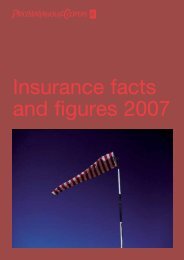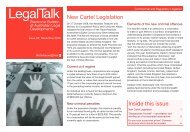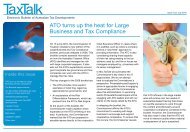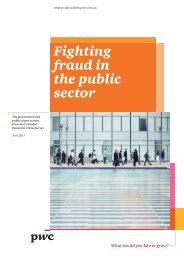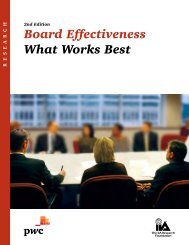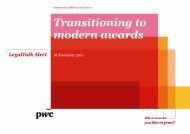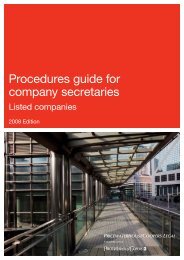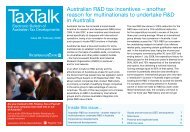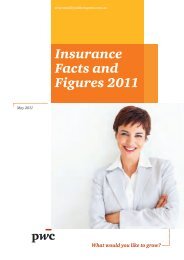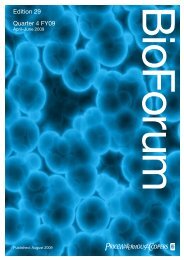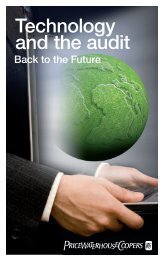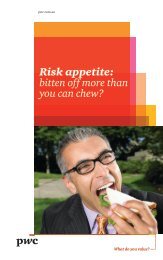Thin capitalisation: eroding asset values and increasing debt ... - PwC
Thin capitalisation: eroding asset values and increasing debt ... - PwC
Thin capitalisation: eroding asset values and increasing debt ... - PwC
You also want an ePaper? Increase the reach of your titles
YUMPU automatically turns print PDFs into web optimized ePapers that Google loves.
TaxTalk – Electronic Bulletin of Australian Tax Developments<br />
• Taxable distributions could be<br />
assessable in the income year<br />
that they are actually received by<br />
beneficiaries (with the trustee claiming<br />
a deduction in the prior year in<br />
certain cases). The discussion paper<br />
acknowledges that this approach<br />
will lead to a deferral of tax revenue,<br />
<strong>and</strong> states that such cost to revenue<br />
would need to be balanced against<br />
the simplicity of resident beneficiaries<br />
being taxed on a distribution<br />
receipts basis.<br />
The Board notes that a further approach<br />
suggested by some stakeholders would<br />
be to change the tax year for all MITs<br />
to 31 March to allow more time for the<br />
preparation of distribution statements<br />
before 30 June.<br />
Treatment of ‘unders’ <strong>and</strong><br />
‘overs’<br />
The Board in its paper considers options<br />
for addressing the under-reporting <strong>and</strong><br />
over-reporting of net income by MITs.<br />
These options are:<br />
• a ’carry forward’ approach, allowing<br />
‘unders’ or ‘overs’ to carry forward into<br />
the following income year, or<br />
• a ‘credit/deduction’ approach,<br />
whereby MITs would pay tax <strong>and</strong> be<br />
subject to the general interest charge<br />
on an ‘under’ <strong>and</strong> attach a tax credit to<br />
the after-tax distribution. MITs would<br />
claim a deduction for an ‘over’ in<br />
the following income year.<br />
The Board is seeking input from<br />
stakeholders on the appropriate<br />
treatment of ‘unders’ <strong>and</strong> ‘overs’.<br />
This includes views as to whether,<br />
under either approach, there should<br />
be a de minimus rule of up to (say) 2<br />
per cent of the net income, <strong>and</strong> if so,<br />
what the consequences should be for<br />
breaching this rule.<br />
International considerations<br />
The Board outlines the current<br />
international tax treatment of MITs <strong>and</strong><br />
highlights the tax benefits afforded in<br />
other countries to certain collective<br />
investment vehicles (CIVs) that are<br />
treated as companies for tax purposes,<br />
even though they are not generally<br />
subject to tax. The Board notes the<br />
advantages available to these corporate<br />
CIVs (with ‘flow through’ tax treatment)<br />
when compared to an MIT, including<br />
for example the availability of tax treaty<br />
benefits to a CIV in its own right. This<br />
is in contrast to an MIT, where treaty<br />
benefits generally cannot be claimed by<br />
the MIT but by each beneficiary, based<br />
on the resident status of the beneficiary.<br />
In light of the above observations made<br />
in the paper, the Board is seeking input<br />
from stakeholders as to:<br />
• the issues they are currently<br />
experiencing under Australian<br />
domestic law <strong>and</strong> tax treaties<br />
with respect to the operation<br />
of international rules for MITs<br />
• suggestions for dealing with<br />
these issues, <strong>and</strong><br />
• whether there would be advantages<br />
in having a deemed corporate ‘flowthrough’<br />
CIV regime in Australia for<br />
international reasons.<br />
Dealing with distributions that<br />
are greater than or less than<br />
net income<br />
The Board notes that distributions of a<br />
MIT will not equal the trust’s net income<br />
for a number of reasons, including<br />
for what are referred to in the MIT<br />
industry as ‘timing’ <strong>and</strong> ‘permanent’<br />
differences. The Board further notes<br />
that the existing mechanism creates<br />
tax distortions <strong>and</strong>, in some cases, can<br />
result in the same amount being taxed<br />
twice. Under this mechanism, amounts<br />
in excess of net income either reduce the<br />
recipient beneficiary’s capital gains tax<br />
(CGT) cost base, or in some cases are<br />
assessed as ordinary income.<br />
In view of the existing problems, the<br />
Board raises a number of options for<br />
change. In the case of ‘tax deferred<br />
distributions’, an option would be to<br />
assess the beneficiary (after adjustment<br />
for the extent that the beneficiary would<br />
not be taxable in full on the gain), rather<br />
than adjusting the CGT cost base of<br />
the beneficiary’s interest. Adjustments<br />
would then need to be made at the trust<br />
level to ensure the distribution was not<br />
included in subsequently-calculated<br />
gains of the MIT. Where distributions<br />
are less than the net income, there<br />
would be a corresponding uplift in cost<br />
base of the units held by beneficiaries<br />
to avoid double tax.<br />
Character retention <strong>and</strong><br />
flow‐through<br />
The Board identifies the following issues<br />
that arise under the current approach of<br />
allowing the character of amounts in the<br />
h<strong>and</strong>s of the trustee to flow through to<br />
the beneficiaries of the trust:<br />
• uncertainty about how the general<br />
deductions of the trust should<br />
be allocated when calculating<br />
the separate components of the<br />
trust’s net income<br />
• uncertainty in determining amounts<br />
that are ‘attributable to’ or ‘taken into<br />
account in working out amounts’,<br />
included in the beneficiaries’<br />
assessable income under specific<br />
mechanisms existing in the income<br />
tax law, <strong>and</strong><br />
PricewaterhouseCoopers :



